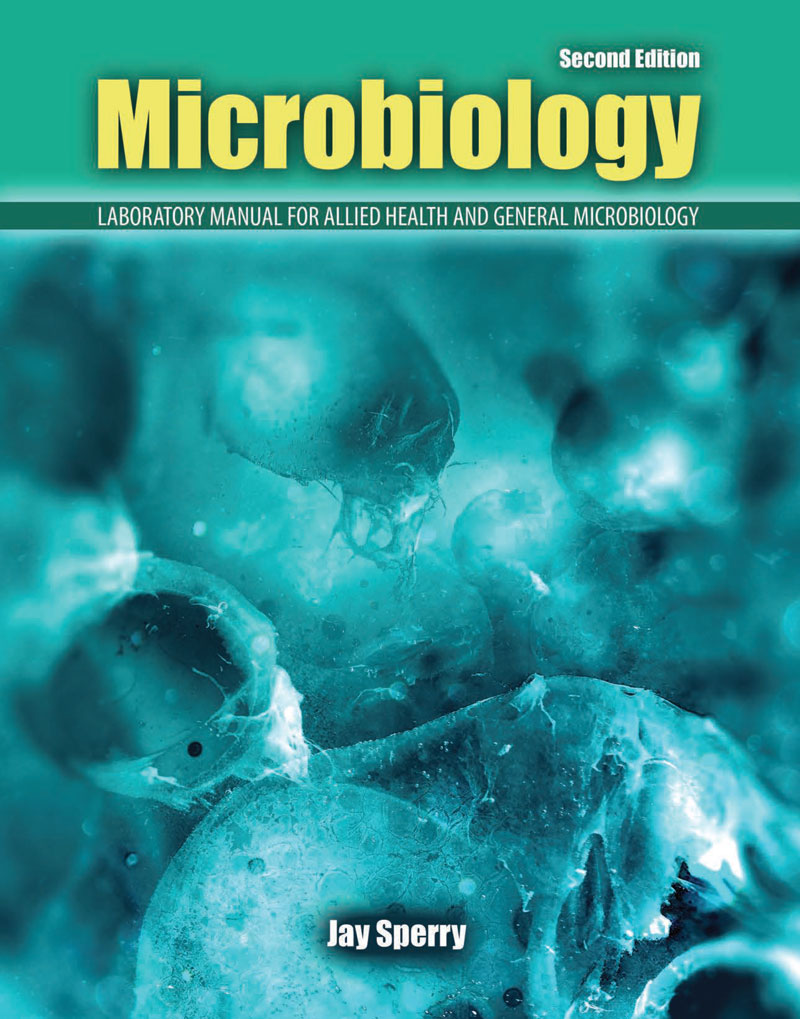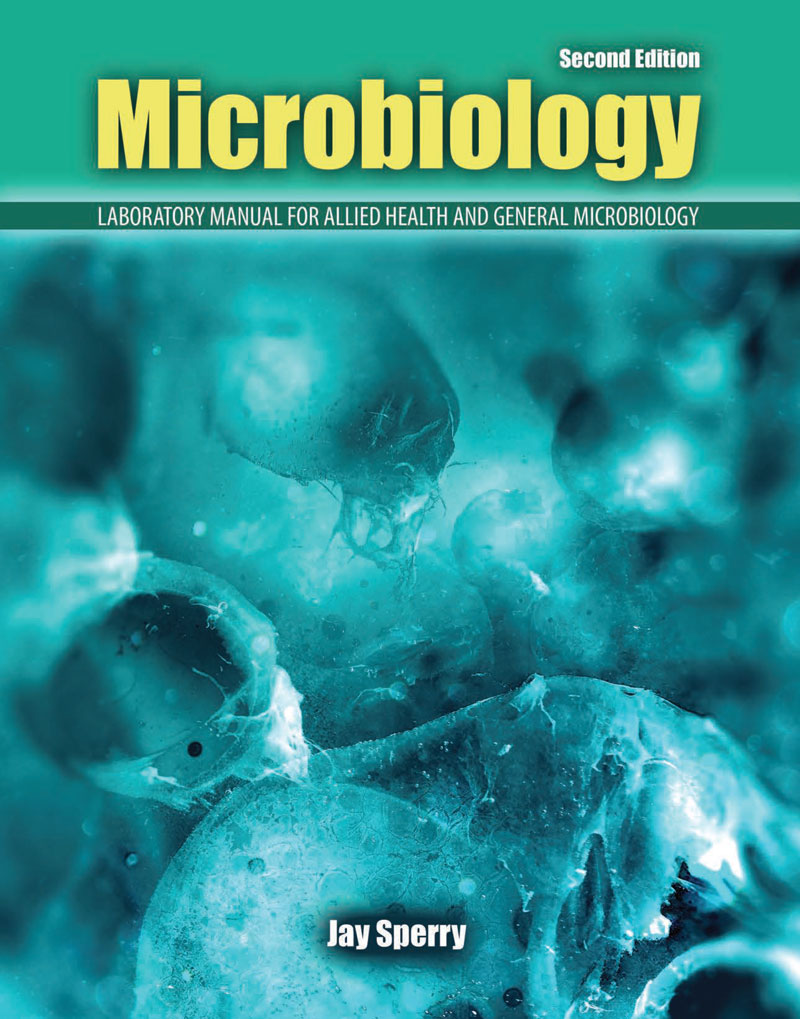Microbiology: Laboratory Manual for Allied Health and General Microbiology
This microbiology laboratory manual has been used for many years for both a general introductory microbiology laboratory manual and for introductory medical microbiology laboratory manual for the allied health disciplines at the University of Rhode Island. It gives a comprehensive coverage of the basics of introductory microbiology, plus some coverage of its applied aspects. Sufficient detail has been given so that the exercises may be performed independently.
Numerous instructions have been provided so that the exercises may be performed with a high degree of success. The appropriate steps have been included, as well as directions concerning when observations should be made and what the results should be. We have also included a number of questions at the end of most exercises. This will allow you the opportunity to challenge your understanding of the principles and applications of the information obtained from the experiment.
Students will learn the fundamentals: safety in the microbiology laboratory, aseptic technique - how to handle microorganisms safely and transfer them between vessels without contaminating either themselves, others in the laboratory or the cultures of microorganisms they are working with. Students will also learn where microbes are found in and around us as well as how to culture them and identify them.
Preface
Introduction
Laboratory Rules and Regulations
Experiment 1: Smear Preparation
Experiment 2: Simple Stain Procedure
Experiment 3: Separation and Isolation of Bacteria from a Mixed Culture
Experiment 4: The Gram Stain
Experiment 5: Bacterial Motility and Cluster Arrangement (Hanging Drop Method)
Experiment 6: Bacterial Endospores
Experiment 7: Preparation and Sterilization of Culture Media
Experiment 8: Physiological Characteristics of Bacteria
Experiment 9: Production of Extracellular Enzymes Hydrolysis of Starch
Experiment 10: Production of Extracellular Enzymes Hydrolysis of Gelatin and Casein
Experiment 11: Fermentation of Carbohydrates
Experiment 12: Reduction of Nitrates
Experiment 13: Production of Indole
Experiment 14: Production of Hydrogen Sulfide
Experiment 15: Reduction of Hydrogen Peroxide
Experiment 16: The MP-VP Citrate Test
Experiment 17: Calibration of the Microscope
Experiment 18: Measuring Bacterial Growth - Optical Density Method
Experiment 19: Enumeration of Live Bacteria Standard Plate Count
Experiment 20: Bacterial Mutation: The Isolation of a Streptomycin-Resistant Mutant
Experiment 21: Bacterial Variation
Experiment 22: Cultivation of Anaerobic Bacteria
Experiment 23: Agglutination of Bacteria
Experiment 24: Immune Precipitation (The Gel Diffusion Test)
Experiment 25: Selective Bacteriostatic Action of Crystal Violet
Experiment 26: Oligodynamic Action of Metals and Bacteriostatic Action of Chemicals
Experiment 27: Antibiosis
Experiment 28: Morphology of Yeast
Experiment 29: Morphology of Some Common Molds
Experiment 30: Effect of the Environment Upon Microorganisms
Experiment 31: Effect of Osmotic Pressure on Microorganisms
Experiment 32: Effect of pH on Growth of Microorganisms
Experiment 33: Effect of Freezing on Microorganisms
Experiment 34: Flora of the Skin
Experiment 35: Flora of the Upper Respiratory Tract
Experiment 36: The Acid-Fast Stain
Experiment 37: Peptonization and Fermentation of Milk
Experiment 38: Counts of Milk Bacteria
Experiment 39: Coliform Analysis of Drinking Water
Experiment 40: Bacteria in Ground Meat
Experiment 41: Bacteriophage Growth
Experiment 42: Oxidase Test
Handwashing Effectiveness Laboratory
Cleanliness and Sanitation
Classroom Epidemic Laboratory
Appendix A Special Comments for Experiments
Appendix B Stains and Reagents
Appendix C Culture Media
This microbiology laboratory manual has been used for many years for both a general introductory microbiology laboratory manual and for introductory medical microbiology laboratory manual for the allied health disciplines at the University of Rhode Island. It gives a comprehensive coverage of the basics of introductory microbiology, plus some coverage of its applied aspects. Sufficient detail has been given so that the exercises may be performed independently.
Numerous instructions have been provided so that the exercises may be performed with a high degree of success. The appropriate steps have been included, as well as directions concerning when observations should be made and what the results should be. We have also included a number of questions at the end of most exercises. This will allow you the opportunity to challenge your understanding of the principles and applications of the information obtained from the experiment.
Students will learn the fundamentals: safety in the microbiology laboratory, aseptic technique - how to handle microorganisms safely and transfer them between vessels without contaminating either themselves, others in the laboratory or the cultures of microorganisms they are working with. Students will also learn where microbes are found in and around us as well as how to culture them and identify them.
Preface
Introduction
Laboratory Rules and Regulations
Experiment 1: Smear Preparation
Experiment 2: Simple Stain Procedure
Experiment 3: Separation and Isolation of Bacteria from a Mixed Culture
Experiment 4: The Gram Stain
Experiment 5: Bacterial Motility and Cluster Arrangement (Hanging Drop Method)
Experiment 6: Bacterial Endospores
Experiment 7: Preparation and Sterilization of Culture Media
Experiment 8: Physiological Characteristics of Bacteria
Experiment 9: Production of Extracellular Enzymes Hydrolysis of Starch
Experiment 10: Production of Extracellular Enzymes Hydrolysis of Gelatin and Casein
Experiment 11: Fermentation of Carbohydrates
Experiment 12: Reduction of Nitrates
Experiment 13: Production of Indole
Experiment 14: Production of Hydrogen Sulfide
Experiment 15: Reduction of Hydrogen Peroxide
Experiment 16: The MP-VP Citrate Test
Experiment 17: Calibration of the Microscope
Experiment 18: Measuring Bacterial Growth - Optical Density Method
Experiment 19: Enumeration of Live Bacteria Standard Plate Count
Experiment 20: Bacterial Mutation: The Isolation of a Streptomycin-Resistant Mutant
Experiment 21: Bacterial Variation
Experiment 22: Cultivation of Anaerobic Bacteria
Experiment 23: Agglutination of Bacteria
Experiment 24: Immune Precipitation (The Gel Diffusion Test)
Experiment 25: Selective Bacteriostatic Action of Crystal Violet
Experiment 26: Oligodynamic Action of Metals and Bacteriostatic Action of Chemicals
Experiment 27: Antibiosis
Experiment 28: Morphology of Yeast
Experiment 29: Morphology of Some Common Molds
Experiment 30: Effect of the Environment Upon Microorganisms
Experiment 31: Effect of Osmotic Pressure on Microorganisms
Experiment 32: Effect of pH on Growth of Microorganisms
Experiment 33: Effect of Freezing on Microorganisms
Experiment 34: Flora of the Skin
Experiment 35: Flora of the Upper Respiratory Tract
Experiment 36: The Acid-Fast Stain
Experiment 37: Peptonization and Fermentation of Milk
Experiment 38: Counts of Milk Bacteria
Experiment 39: Coliform Analysis of Drinking Water
Experiment 40: Bacteria in Ground Meat
Experiment 41: Bacteriophage Growth
Experiment 42: Oxidase Test
Handwashing Effectiveness Laboratory
Cleanliness and Sanitation
Classroom Epidemic Laboratory
Appendix A Special Comments for Experiments
Appendix B Stains and Reagents
Appendix C Culture Media

